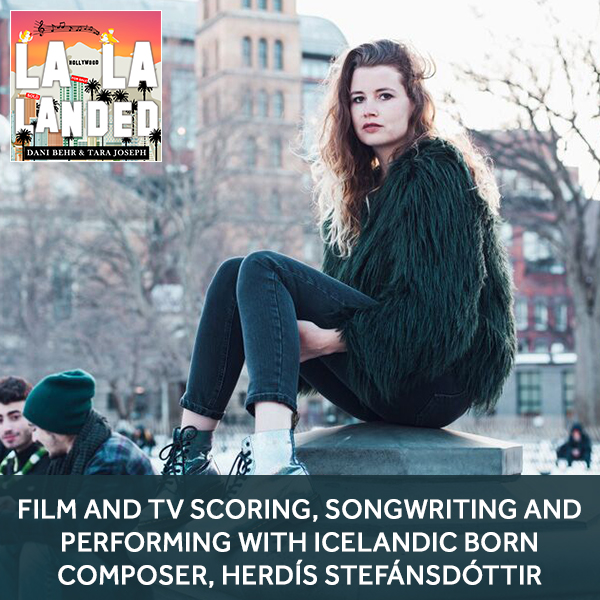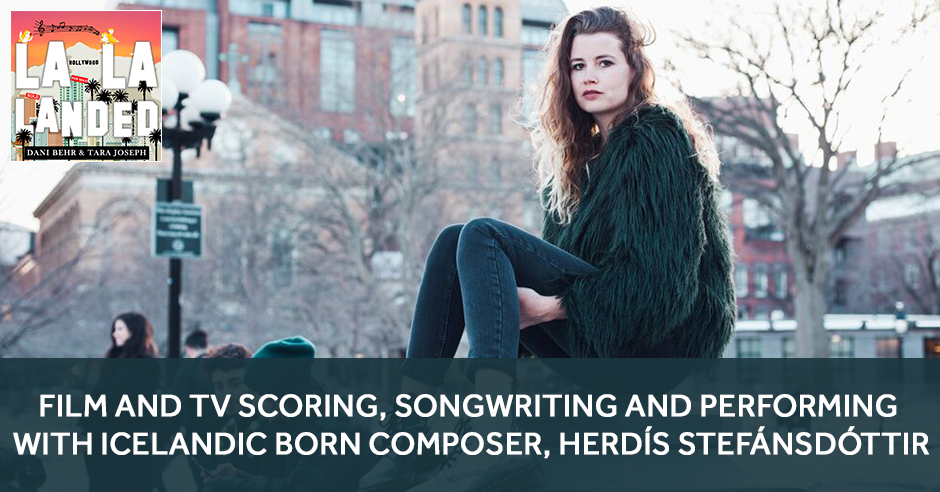
When watching our favorite films or TV series, we tend to take for granted that much of the experience we get comes as much from the musical score as from the pictures themselves. Tara Joseph is joined by Icelandic-born composer, songwriter and electronic musician, Herdís Stefánsdóttir in this episode. Herdis has scored two feature films, is currently working on a big project for HBO, as well as a number of short films. Herdís shares the story of how she used her natural gift for musical composition to achieve success in film and TV scoring at a young age. She also describes the painstaking and demanding process of writing scores, as well as her passion in making musical installations for museums and making and performing music as part of her electronic music duo, East of My Youth.
—
Listen to the podcast here:
Film and TV Scoring, Songwriting and Performing with Icelandic Born Composer, Herdís Stefánsdóttir
I’m looking forward to chatting with our guest. She is a composer of music for multimedia, a songwriter and an electronic musician. Welcome to the show Icelandic born Herdís Stefánsdóttir. How are you?
I’m good. I’m sitting in Iceland in quarantine. It’s definitely strange times, but I’m going to be free soon.
I hope that we can say the world can be free soon. It’s such strange times. It’s an unprecedented and scary situation. How are you bearing up? How have you been dealing with and coping with the situation?
I arrived in Iceland and it felt good to be here, to be honest. I’m half-based in Los Angeles and I have to admit that the situation was affecting me. I was feeling stressed and uncomfortable. Mostly scared for the world.
Was it easy to get out of the US to get back to Iceland?
It was not at all. It was the weirdest thing. I packed my life and brought my daughter, my boyfriend and we were trying to get home but the flights got canceled over and over. We were on hold with everything ready for 4 or 5 days. We finally got on an empty flight to Boston. There were three other people on the plane and from there we got to Iceland. It is stressful.
I’m pleased and relieved to know that you made it home and that you’re so far so good. Are you staying with your family?
No, we are in a separate department because we are quarantined, so we’re not allowed to meet anyone.
Thank you so much for being on the show. As a composer, you have chosen isolation a lot of the time as you’re creating your masterpieces. How does it feel composing and being creative under forced isolation?
Honestly, it’s not a big difference I would say, especially in a job like that. It’s forced isolation anyway because you’re always working under strict deadlines and there’s no way out. You’re forced to be in your studio night and day. It’s sad, but truly not a huge difference.
Were you a musical child, did you always want to be a composer? Take us back to the beginning and tell us how it all happened for you.
I was a musical child and I did play the piano. I remember I was eight when I started and I had all these dreams that I would be a concert pianist and I would be so good. I became a teenager, I was lazy and I stopped practicing. I continued doing piano lessons until I was 18 or 19, but I was never that good. I stopped going to music school and for me, it didn’t feel like an option to be a musician. It was not something that I knew was possible for me. I did not think of that and I thought I was supposed to do something practical, something that would earn money and would be saved. I was focusing on that path when I was a teenager doing physics and math. I ended up going to law school. If someone had told me when I was twenty that I would become a composer, I would not have believed it.
How did you make the transition from wanting to be a lawyer to then wanting to be a composer?
I never wanted to be a lawyer. I was maybe trying to do something that I thought I was supposed to do, but it was absolutely not something that I wanted. I figured out, it was interesting. The first year I was studying law. I know it’s a great thing for some people and some people already enjoyed it and it’s important and all that. I was profoundly miserable in my study. It did not appeal to me at all and I thought it was incredibly dry and boring. If I had followed my heart to study something in university, I would’ve picked philosophy, literature or something that I was interested in. I didn’t pick this and I thought I needed to do that.
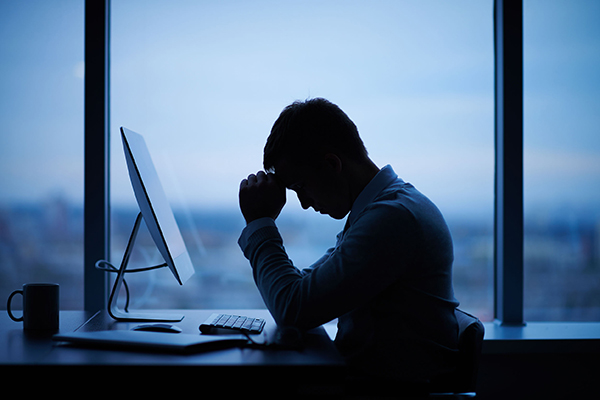
During the first year of law school, I started playing the piano again and I hadn’t played for maybe 3 or 4 years. I didn’t only start playing, but I started composing music for the first time in my life. I was 21 years old. I did not know that I could compose. I’d never thought about it. I was honestly surprised. I did spend a lot of time. I would rush home after the classes. I would sit down and I would play and write. I started to get more serious and I started to study music theory on my own for the first time in my life. I hadn’t studied theory before and started to teach myself how to arrange for strings and quartets. I wrote my first choir piece and this was all happening while I was in law school. It gradually started taking over.
You ended up going to NYU to study film scoring there. What was that experience like because it’s such an amazing university?
It was interesting. To be completely honest, I wasn’t sure when I was doing it. I wasn’t sure about it and I wasn’t even sure if I liked it. To be quite frank, I quit my studies when I was halfway through and I started doing my music and get an internship. I moved to Berlin and then I got back to it. That’s been like back and forth. It’s been a journey.
I was reading your bio and I’ve been looking at different articles about you online and listening to your music. I love what I’ve heard and I love what I’ve read. For the readers out there, who perhaps would love to compose music but are trying to work out how they go about having the right mindsets and trying to come up with the right creative concepts, perhaps you could talk us through your process. How you go about creating a score, whether it’s as a songwriter or that’s a piece of music? With a score specifically, how you go about making that happen? What’s your process? What advice would you give to people out there reading?
For me, it’s a different process for every single film. That’s a different process from film to writing my music. Before every project, I’m like, “I have no idea what I’m going to do. I can’t do this.” I’m going to sit underneath the piano and I’m defeated. I have no idea. The most important thing is to sit down and start the process because before it starts, it can sound overwhelming or you feel like you’re not inspired or don’t have ideas. I feel as soon as you start digging into it, things start happening. It’s about sitting and doing it. The more I’m merged into the process and the deeper I get into it, the more I get into the state. That is important for me when I’m writing music and that almost like a meditation state where I barely notice the time when I’m doing it, but it’s happening naturally.
When you were writing at a film score, do you read the script first? How does that process work?
It depends on projects. Sometimes you get the script. Sometimes you’re in the process before its film, then you have read the script and then you see the film. Sometimes you come late in the process and you’ll already get the film and everything is ready, so you can sit down and watch the film.
The most important thing about writing scores is to just sit down and get the process started. Before that, it can sound overwhelming. Click To TweetYou have been nominated in the past for an Icelandic Music Award for the score that you wrote for The Sun Is Also a Star that was an MGM/Warner Bros. feature. That must’ve been an exciting moment for you. Tell us a bit about that.
When life is random. I have an agent and she asked me to make reel, collect a portfolio of my music for this film that they wanted another composer for. I did that and we submit it. At the time that I did that, I had not scored a feature film before, so it didn’t have that experience. We knew that it was a long shot. We did not expect anything to happen and nothing happened. We submitted the portfolio. We didn’t hear anything as we expected. It wasn’t until about half a year later that my agent calls me and she’s like, “Herdis, you’re not going to believe this.” I’m like, “What?” “MGM just called me.” I’m like, “Who was MGM?” He’s like, “MGM/Warner Bros. They want to hire you for this film.” Honestly, I could not believe it. Somehow the reel had gotten to the director and she had listened to it. She felt it was right. It’s one of those random things in life that you don’t think are going to happen and then somehow it did.
That’s was exciting and what an amazing opportunity. I’m sure that many other opportunities that come your way.
It was such a big project and a big experience for me to work on a project like this.
Tell us about We’re Here, the HBO series you scored. How long did it take to do that project? How long did it take to write the score?
I’m in the middle of it. It’s six episodes. I just finished up to three. There are three more to go.
How long does each episode take you?
I have been working on it. I’m lost in time and space. I barely know what month it is, but I have been working on it for several months.
How does the process work for you? Are you reading episode one and then you start creating? How are you writing the score? It’s fascinating.
This is a different process because this is a TV series and then it’s unscripted. With TV it happens a bit faster. The more episodes you get, the faster the process is. It got quite a while to do episode one and get into the story and you’d start this a rough cut. They keep editing the episode as you are writing the music. You’re constantly getting a new cut, things are changing, the scenes are changing and you have written music that is not in the cut anymore. It’s a fast process. You write a lot of music in a short amount of time.
Do you have a preference for writing for TV or film?
This is my first TV series. I don’t know, honestly. I do like having time for things and then it would definitely be a dream to be able to do projects where you have time to sit down, dig in and time to do something special. I would love to do projects where I would have a lot of time.
Do you have specific directors whose work you look at and think, “I would love to work with that director, that writer or those people out there.” Who are on your hit list?
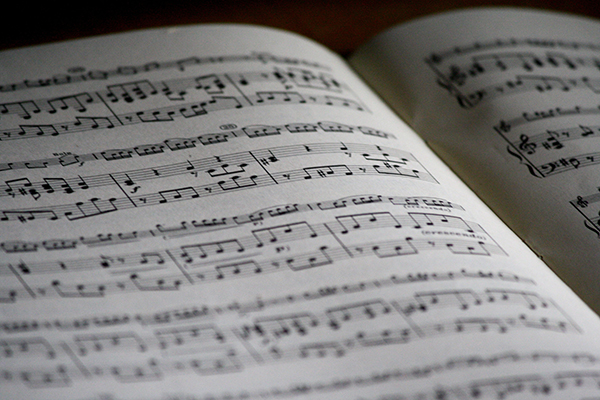
I don’t like naming any names, but their directors, films and things that I would love to work on.
Do you have specific composers who you have always admired and whose career considerably older than you who you have looked up to and thought, “That’s a career I would love to have, loved to follow?” Looking at its independent route and opportunities that particularly relate to Herdís Stefánsdóttir so to speak.
I don’t follow careers. I don’t know or maybe think about one’s career, but more I love someone’s music. I always have a hard time naming a name. It changes a lot.
That’s okay. You don’t need to name anyone. I just wondered, but the answer was yes, there were certain people who you love?
Yes, of course. I need to sit down and because I get this question. Every time I’m like, “I don’t know. I can’t answer it.” I should have an answer for that in the future.
I’m going to be sitting here thinking, “Who could it be?” I’ve also learned that you have some music installations in museums. Tell me a little bit about that. Tell me about where the museums are. What installations are they?
I have worked on different things. I have done more like soundscapes or something that lives inside off a museum for a moving Michelle piece. It’s been different things. A lot of it is creating sounds, sound design, and soundscapes with artists. It’s a different process from film scores.
Do you enjoy the process?
I do. It’s a freer form of expression than film, which is more linear and you’re always working with a story. It’s more abstract than it can be anything.
You’re incredibly busy and multitalented with all the different areas of composing that you’re in. I also understand that you’re part of an electronic music duo, East of My Youth.
We haven’t been working a lot the past couple of years, but we did make a record together and a few extra songs.
I love the line that was used to describe the sound, “Sensual and addictive as getting your tongue frozen to a glacier of pure honey.” That’s quite something. Would that about sum it up?
I would say so.
What are your plans for East of My Youth? Is that something you want to push forward with or is this film and TV scoring taking precedence?
I’ve been busy with film and TV scoring the past couple of years, but I am working on my first solo record. I’m putting it out there because the pressure is on to finish it, but that’s something that I’m constantly working on whenever I have time.
Will you be singing on that or it’s just instrumental?
A music installation is a freer form of expression. It’s more abstract and it can be anything. Click To TweetThere will be vocals, not just mine.
When you’re not composing music and when you’re not in force isolation, what do you love to do? What are your hobbies? You mentioned you had a daughter?
I have a sixteen-month-old daughter.
Congratulations. Can you see that she might have any musical talents?
Both their parents are composers, so it will be interesting to see if she does. She has musicals. She has music in her. She is interested, but I do think that a lot of kids this age are interested in sounds and music.
What do you like to do when you’re relaxing and normally able to go out and about?
I’m an active person. I like going hiking, moving, exercising, getting out of the studio and being in nature. I also like going out, seeing art, going on for good food.
How do you find life in Iceland compared to life in LA? Because they’re such worlds apart.
When it comes to weather, I feel like California has a lot of nature and people that want to go out and be under the sky. I feel like when the weather allows in Iceland, it is too here. People go into over the hardest winter months, people crawl into their houses and don’t do much. As soon as the sun starts coming out and the days are longer, it’s almost like people get hyperactive.
How cold does it get in the winter there?
It some minus degrees but it’s windy, so it sometimes feels like a minus 100 degrees.
LA is the epicenter of the entertainment industry, film, TV, music, the whole shebang. How is the music industry in Iceland?
It’s a beautiful music community. There’s a lot of music here and it’s always been. It’s a big part of Iceland. This industry like it is in Los Angeles, but it’s a lot of music, musicians and people doing good music.
Were there a lot of opportunities to see people performing live, etc.?
Yes, for sure.
How do you split your year or do you come and go whenever necessary?
It’s been random. We’re trying to spend the winters in California and summers in Iceland.
What can we expect in the future from you? Is it a perfect world in five years, where would you like to be?
Hopefully, alive and well making music and I will have released some of my music.
I’m sure you will. Whilst you’re in isolation where you’re knuckling down and focusing on the TV project that you’re working on or instead of trying to do all the things as well whilst still with your partner and your daughter?
I’m mostly doing the TV show. It’s a big project and it takes up a lot of my time, especially in isolation and quarantine because I had to set up in the kitchen. I can imagine it’s a little bit crazy to be 24/7 inside a small apartment with a toddler writing for an HBO series. We can say that it’s a life experience.
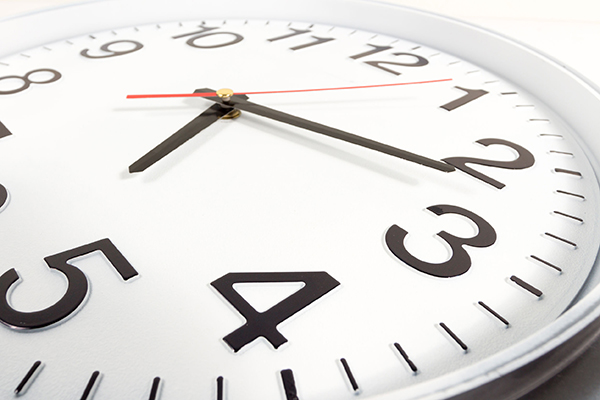
When you come out of quarantine in a few days, are you still on lockdown there or would you be able to see your family?
There’s no lockdown in Iceland. There is social distancing and it’s recommended that you only need your closest family.
When you come out to quarantine, you’ll be able to see your nearest and dearest?
Yes, absolutely.
I’d been to Iceland many years ago and I loved it. I remember that the water was some of the best drinking water out of a tap that is that I ever had. Amazing chocolate raisins. I also went to the hot spring. It was an extraordinary experience. It is quite mesmerizing country because it’s different and the ruggedness of the landscape never leaves you. You always remember what Iceland is like. I would say it must feel quite special to be Icelandic.
It’s not a lot of Icelanders. Sometimes I’m like, “It’s such a crazy place to be from.” It’s a small island in the north part of the world. Weather is insane. Sometimes you curse that you’re Icelandic. It’s April and there was a snow blizzard. Definitely be like tough places in that sense but then it gets beautiful in spring, summer, and fall and then winter comes and you’re like, “Why am I from here?” It’s ups and downs.
I can’t wait to come back in the future. It would definitely be somewhere I’d love to explore further because I wasn’t there for very long last time. It’s been such a delight and a pleasure to have you on the show. I’m excited to know more of what you have to offer over the years ahead and to know your score for the HBO series, We’re Here. Thank you. You’ve been an amazing guest.
East of My Youth’s music is as sensual and addictive as getting your tongue frozen to a glacier of pure honey. Click To TweetThank you so much.
I wish you to stay safe and healthy. I wish the same for your family and to all our readers out there, I hope you enjoy this particular episode. You will be hearing from me again soon. Stay safe. Bye.
Important Links:
- Herdís Stefánsdóttir
- East of My Youth – Facebook page
About Herdís Stefánsdóttir
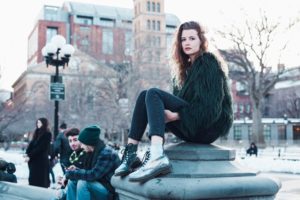 Herdís Stefánsdóttir is a composer of music for multimedia, a songwriter, and an electronic musician. Her compositional endeavors — installations in museums, dance, theatre, and a successful electronic music duet she is a part of – are establishing her as an expansive artist.
Herdís Stefánsdóttir is a composer of music for multimedia, a songwriter, and an electronic musician. Her compositional endeavors — installations in museums, dance, theatre, and a successful electronic music duet she is a part of – are establishing her as an expansive artist.
Herdís Stefánsdóttir graduated with a M.A. degree in film scoring from New York University in 2017. Since graduation she has scored two American feature films and a few short films. Herdís just finished scoring her first Hollywood film, “The Sun is Also a Star”, a MGM and Warner Brothers production. Herdís interned for the Oscar nominated composer Jóhann Jóhannsson in Berlin while he was working on the film Arrival (2016) and she has scored numerous short films that have premiered at top-tier festivals around the world like Berlinale, TIFF, Sundance and Palm Springs International Film Festival.
Herdís formed her electro-pop duet East of My Youth in 2015. East of My Youth’s music has been described as sensual and addictive as getting your tongue frozen to a glacier of pure honey (jajaja music). The duo has showcased at SxSW, Eurosonic Noorderslag, KEXP, Sonar Reykjavík and Iceland Airwaves.
Born in Reykjavík, Iceland, Herdís currently lives in Berlin, where she works as a composer.

